

With a large enough angle of rearward sweep, in the transonic to low supersonic speed range the wing's leading edge remains behind the shock wave boundary or shock cone created by the leading edge root. This is an F-106 Delta Dart, a development of their earlier F-102 Delta Dagger Transonic and low-supersonic flight Ĭonvair made several supersonic deltas. It may be countered through the use of leading-edge slots, wing fences and related devices.

The sideways effect also leads to an overall reduction in lift and in some circumstances can also lead to an increase in drag. Especially for a slender delta, the centre of lift approximates to halfway back along the leading edge. In this condition, lift is maximised along the leading edge of the wing, where the air is turned most sharply to follow its contours. A characteristic sideways element to the airflow develops. In the subsonic regime, the behaviour of a delta wing is generally similar to that of a swept wing. In this condition, the centre of lift approximates to the centre of the area covered by the vortex. The ogee or "wineglass" double-curve, seen for example on Concorde, incorporates this forward extension into the profile of the wing. For intermediate sweep angles, a retractable "moustache" or fixed leading-edge root extension (LERX) may be added to encourage and stabilise vortex formation. The lower extremity of this vortex remains attached to the surface and also accelerates the airflow, maintaining lift. However for a sharply-swept delta wing, as air spills up round the leading edge it flows inwards to generate a characteristic vortex pattern over the upper surface. Ordinarily, this flow separation leads to a loss of lift known as the stall. At a sufficiently high angle the wing exhibits flow separation, together with an associated high drag. Like any wing, at low speeds a delta wing requires a high angle of attack to maintain lift. However, on supersonic designs the opportunity is often taken to use a thinner aerofoil instead, in order to actually reduce drag.Īerodynamics Low-speed flight and vortex lift This both enhances its weight-saving characteristic and provides greater internal volume for fuel and other items, without a significant increase in drag.

Its long root chord also allows a deeper structure for a given aerofoil section. Because of this it is easy and relatively inexpensive to build – a substantial factor in the success of the MiG-21 and Mirage aircraft series. It can be built stronger, stiffer and at the same time lighter than a swept wing of equivalent aspect ratio and lifting capability. The long root chord of the delta wing and minimal area outboard make it structurally efficient. Many design variations have evolved over the years, with and without additional stabilising surfaces. The delta wing form has unique aerodynamic characteristics and structural advantages. At the other end of the speed scale, the Rogallo flexible wing proved a practical design for the hang glider and other ultralight aircraft. It is named for its similarity in shape to the Greek uppercase letter delta (Δ).Īlthough long studied, it did not find significant applications until the Jet Age, when it proved suitable for high-speed subsonic and supersonic flight. The Dassault Mirage III was among the most successful delta-winged typesĪ delta wing is a wing shaped in the form of a triangle.


 0 kommentar(er)
0 kommentar(er)
